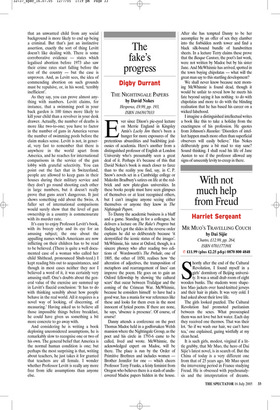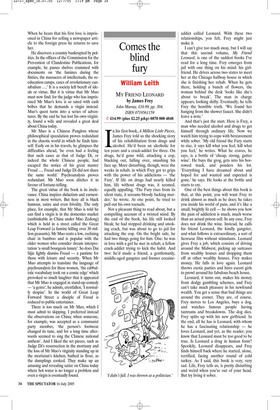With not much help from Freud
Harriet Sergeant
MR MUO’S TRAVELLING COUCH by Dai Sijie Chatto, £12.99, pp. 264, ISBN 070117739X ✆ £11.99 (plus £2.25 p&p) 0870 800 4848 Shortly after the end of the Cultural Revolution, I found myself in a girls’ dormitory of Beijing university. It was a small drab room of eight wooden bunks. The students wore shapeless Mao jackets over hand-knitted jerseys and their hair in plaits. It was very cold. I had asked about their love life.
The girls looked puzzled. The Cultural Revolution had promoted puritanism between the sexes. What preoccupied them was not love but hot water. Each day they received one thermos. That was their lot. ‘So if we wash our hair, we can’t have tea,’ one explained, gazing wistfully at my clean head.
It is such girls, modest, virginal if a little grubby, that Mr Muo, the hero of Dai Sijie’s latest novel, is in search of. But the China of today is a very different one from that of 25 years ago. Mr Muo spent the intervening period in France studying Freud. He is obsessed with psychoanalysis and the interpretation of dreams. When he hears that his first love is imprisoned in China for selling a newspaper article to the foreign press he returns to save her.
He discovers a country bankrupted by politics. In the offices of the Commission for the Prevention of Clandestine Publications, for example, he passes shelves crammed with documents on ‘the famines during the Sixties, the massacres of intellectuals, the reeducation camps, cases of revolutionary cannibalism ....’ It is a society left bereft of ideals or virtue. But it is virtue that Mr Muo must now find; for the judge who has imprisoned Mr Muo’s love is so sated with cash bribes that he demands a virgin instead. Muo’s quest turns into a series of adventures. By the end he has lost his own virginity, found a wife and revealed a great deal about China today.
Mr Muo is a Chinese Pangloss whose philosophical speculation proves redundant in the chaotic world in which he finds himself. Early on in his travels, he glimpses the difficulties ahead, ‘he even had a feeling that such cases as that of Judge Di, or indeed the whole Chinese people, had escaped the notice of his great master Freud .... Freud and Judge Di did not share the same world.’ Psychoanalysis proves redundant. Mr Muo soon ditches it in favour of fortune-telling.
The great virtue of the book is its irrelevance. China inspires didactism and earnestness in most writers. But here all is black humour, satire and even frivolity. The only place, for example, that Mr Muo is told he can find a virgin is in the domestics market (unthinkable in China under Mao Zedong) which is held in a street called the Great Leap Forward (a famine killing over 30 million peasants). Mr Muo rents a low, reclining chair in bamboo and is popular with the older women who consider dream interpretation ‘a small bourgeois luxury’. So does Dai Sijie lightly dismiss Freud — a pastime for those with leisure and security. When Mr Muo attempts to translate the language of psychoanalysis for these women, ‘the cabbalistic vocabulary took on a comic edge’ which provoked so much laughter that it appeared that Mr Muo is engaged in stand-up comedy — ‘a genre’, he admits, crestfallen, ‘I normally despise’. In the world of Great Leap Forward Street a disciple of Freud is reduced to public entertainer.
There is too much on Mr Muo, which I must admit to skipping. I preferred instead the observations on China; when someone, for example, was accepted as a communist party member, ‘the person’s footwear changed its tune, and for a long time afterwards seemed to sing the Chinese national anthem’. And I liked the set pieces, such as Judge Di’s resurrection in the mortuary and the loss of Mr Muo’s virginity standing up in the mortician’s kitchen, bathed in flour, as the dumplings cooked. They make up an amusing and revealing satire on China today where hot water is no longer a problem and even a virgin is eventually found.



























































 Previous page
Previous page